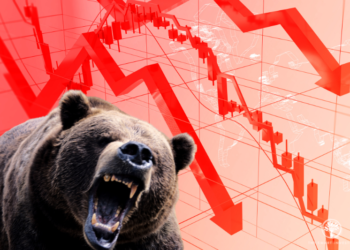The Ghana Stock Exchange (GSE) ended the week under review in negative territory, with the benchmark GSE Composite Index (GSE-CI) declining by 11.47 points, representing a 0.14% fall to close at 8,367.12 points.
This marks a weekly loss of 1.52%, following weeks of consistent growth. Despite the setback, the index still maintains an impressive year-to-date gain of 71.16%, underscoring a generally resilient performance across the 2025 trading year.
The decline came amid reduced investor activity and a slowdown in trading momentum. Market capitalization dipped to GHS 166.5 billion, reflecting a loss in overall market value as investor sentiment turned slightly bearish. Analysts suggest the pullback is part of a natural market correction following a series of strong performances earlier in the month.
Interestingly, while the broader market trended downward, the GSE Financial Stocks Index (GSE-FSI) posted a modest gain. The index climbed 0.34% to close at 4,098.11 points, marking a weekly gain of 0.85%. On a four-week basis, financial stocks have surged 9.24% and now boast a year-to-date gain of 72.13%, outperforming the composite index.
This resilience in financial stocks is attributed to renewed investor interest in the banking and insurance sectors, which have shown signs of recovery and profitability. Market watchers believe the performance of major financial institutions such as GCB Bank, Societe Generale Ghana, and SIC Insurance Company played a significant role in keeping the sector buoyant amid broader market weakness.
Unsurprisingly, market activity slowed considerably during the week. The exchange recorded a total of 878,402 shares traded, corresponding to a market value of GHS 4,082,073.23. This represented a 45% decline in trading volume and a 6% drop in turnover compared to the previous trading day.
The decline in trading activity reflects a cautious investor stance as participants assessed market signals and awaited new economic data. The drop also points to reduced liquidity in some major counters, particularly in non-financial sectors that had previously driven market rallies.
NewGold ETF Leads Gainers with Remarkable 25% Jump
Among the 17 equities that participated in trading, there were four gainers and three losers. NewGold ETF emerged as the standout performer, surging 25.11% to close at GHS 459.28 per share, making it the top gainer for the week.
Other gainers included Clydestone Ghana, which climbed 10%, Societe Generale Ghana, which advanced 9.8%, and GCB Bank, which posted a slight 0.06% increase. These gains were, however, insufficient to offset the overall market dip.
Market analysts note that the impressive rise in NewGold ETF reflects strong investor interest in commodities and gold-backed instruments as investors seek to hedge against inflation and currency volatility.
On the losing side, CalBank suffered the steepest decline, with its share price dropping 5.88% to close at GHS 0.80 per share. Mega African Capital followed with a 3.35% loss, while MTN Ghana saw a modest 0.47% decline.
Despite its minor loss, MTN Ghana recorded the highest trading volume for the week, with 415,526 shares traded. It was followed by SIC Insurance Company with 166,897 shares, Ecobank Transnational Incorporated (ETI) with 122,009 shares, and CalBank with 60,592 shares.
The dip in MTN Ghana’s share price weighed slightly on the benchmark index, given its significant market capitalization and influence on overall GSE performance.
Analysts Expect Short-Term Correction
Financial analysts maintain that the GSE’s weekly decline is not necessarily a cause for concern. According to market observers, the drop signals a short-term correction following weeks of bullish trading. The overall 71.16% year-to-date gain underscores strong investor confidence in Ghana’s equities market, especially in financial and consumer sectors.
Some analysts predict that the market may rebound in the coming weeks as investors take advantage of lower prices to accumulate shares, particularly in high-performing sectors such as banking, telecommunications, and insurance.
As the GSE heads into the final trading week of October, investors are expected to monitor macroeconomic developments closely, including inflation trends and exchange rate movements, which have a direct impact on market sentiment.
The resilience of the financial stocks index, coupled with continued demand for gold-backed instruments, may provide a cushion for the market in the short term. However, sustained recovery will depend on renewed investor participation and broader economic stability.
The Ghana Stock Exchange may have ended the week in red, but the fundamentals remain strong. The dip in market capitalization to GHS 166.5 billion and the fall in trading volume underscore a temporary slowdown rather than a loss of confidence. With financial stocks maintaining their upward trajectory and the year-to-date gain still above 70%, the GSE remains one of Africa’s best-performing markets in 2025.
READ ALSO: PFAG Blames Illegal Mining for Falling Crop Yields and Cocoa Output























